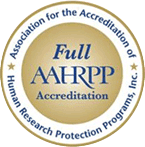Index
Good Application Initiative
Summer Student Research Internships
Project Closure Memo Now Available in HawkIRB
Herky Hint: Deception Requires a Waiver of Consent
Reminder: Complete the Pre-Grant Submission Survey for Single IRB Model
Recap of “The Single IRB Process: Navigating the Waters”
Recap of Casting the Net: Research Ethics in the Age of Social Media
Medical Ethics Advisor Newsletter, April 2023
In the News
Good Application Initiative
By Rachel Kinker, MPA
Starting in August 2022, in an effort to recognize the hard work and time that PIs, delegates, and research team members have put into New Project applications, the IRB and the Human Subjects office began recognizing New Project applications with the following features.
- Expedited applications: 6 or fewer workflow items and no more than 2 rounds of workflow
- Exempt applications: 3 or fewer workflow items and no more than 1 round of workflow
- Full Board applications: 12 or fewer workflow items and no more than 4 rounds of workflow
These criteria were developed based on the complexity of the review type (expedited, exempt, full board), the average number of workflow items, and the average rounds of workflow based on all submissions.
When the above criteria are met, an email is sent by the IRB chair who reviewed the application to the PI, delegate(s), faculty advisor, and DEO congratulating the research team on the excellent quality of their application. In any given month there are 70-100 New Project applications submitted for Expedited, Exempt, or Full Board review (please note that this does not include the Human Subjects Research Determination submissions). On average, approximately 28% of applications each month meet these criteria. This recognition by the IRB and HSO acknowledges the effort, time, and attention put into these applications as high-quality submissions help the IRB review projects more effectively and efficiently. For those working on their applications, the HSO offers many resources to assist researchers in developing their new project application, such as Office Hours, Educational Tools, and the IRB ICON Course for Researchers.
Summer Student Research Internships
By Kelly O’Berry, BS, CIP
Complimentary UI Appointment
Even if the student is a volunteer or unpaid intern, the department can grant a complimentary pay appointment. This gives the volunteer/intern a HawkID for completing the human subjects protection training and being added to the research team.
- Human Subjects Protection Training - When volunteers/interns complete the human subjects protection training in the CITI Program, they should use their HawkID as their username. Advise them to follow the directions carefully to make sure they complete the correct training in the CITI Program. Inform them whether to complete the Group 1 (Biomedical research) or Group 2 (Social Behavioral research) module.
- Research Team Member – In Section II of the HawkIRB application, add volunteers/interns with a complimentary appointment as UI members of the research team.
Non-UI Team Members
Volunteers/interns without a UI appointment also complete the human subjects protection training in the CITI Program and are added to the research team, but the process is slightly different. Note: This is NOT an option for individuals who are less than 18 years of age.
- Human Subjects Protection Training – Unaffiliated volunteers/interns do not have a HawkID. They can choose their own username when they complete the UI human subjects protection training in the CITI Program. Advise non-UI team members to follow the directions carefully to make sure they complete the correct training in the CITI Program. They will need to know whether to complete the Group 1 (Biomedical research) or Group 2 (Social Behavioral research) module.
Since the Human Subjects Office cannot use the UI Directory to confirm that the student intern completed the correct training module, we will send an email to ask why the non-UI team member completed the UI training requirement. Advise them to watch for and respond to that email. Alternatively, the PI or a research team member can send an email to irb-outreach@uiowa.edu with names of non-UI team members. Please provide the PI name and department and the IRB number (if known).
- Research Team Member – In Section II of the HawkIRB application, add unaffiliated volunteers/interns as non-UI team members. Provide a detailed description of their planned research activities. Generate and complete the Individual Investigator Agreement (IIA) Worksheet, available on the ‘Attachments’ page. This form requests approval from the UI Institutional Official for IRB Oversight. Since minors are not of legal age to sign the agreement, this is not an option for them. There is not a mechanism for parent/guardian signature on the IIA on behalf of a minor volunteer/intern.
Additional Policies and Guidance
See also the UI policy regarding minors on campus (Operations Manual, Section II Community Policies, Chapter 16 University Programs with Minors). Consult with your departmental Human Resources representative regarding compliance with this policy for high school student interns.
Additionally, consult the UI policies regarding minors interning in research laboratories from the College of Liberal Arts and Sciences and the Carver College of Medicine. Supervisors must undergo background checks and Minor on Campus Training (in Employee Self Service, Course #WRM002). Both policies refer to the following guidelines:
- Proposed Project Checklist for Minors Interning in Research Laboratories (signed by Department Executive Officer or their designee and the Office of the Vice President for Research. If exemptions are requested on the checklist, it must be signed by the Associate Dean for Research.)
- Rules for Minors in Research Laboratories (signed by minor and parent or guardian)
- Parental Consent Form (signed by parent or guardian)
- Waiver, Release, and Indemnification Agreement (signed by parent or guardian)
- Emergency Medical Treatment Authorization (signed by parent or guardian)
- Potential Hazards in Research Laboratories – Information Sheet (signed by parent or guardian)
Project Closure Memo Now Available in HawkIRB
You’ve asked and we’ve answered! University of Iowa researchers are often asked to provide formal documentation to a sponsor when a research project is closed with the IRB/HRPP (Human Research Protection Program). Until now, the HawkIRB system has not been able to accommodate the request. A HawkIRB update now provides a closure memo when a closure form is submitted in HawkIRB.
We are happy to announce another research community request has been completed! After project closure forms submitted to HawkIRB are fully processed by IRB/HRPP, HawkIRB will now have a closure memo available. HawkIRB will send an automated email to the Principal Investigator, their delegates, and any study contacts indicating the project was formally closed with a link to the closure memo. Closure memos will be issued on both a research project under a local IRB review (IRB-01, IRB-02, or IRB-03) or an external IRB submission. The closure memo can be accessed by either following the URL link in the email or by going to the Project Summary page and the “Approval” tab in HawkIRB.
Then look for “closure-memo.rtf.” Open and save the document to your files. Share it with your sponsor or others as applicable.
The Closure memo contains important information regarding the study team’s obligations regarding record retention and research data requirements even after the study is closed. If you have any questions regarding this change, please either call (319) 335-6564 or email irb@uiowa.edu. We welcome other ideas the research community has for future HawkIRB enhancements. Be sure to stay tuned to the IRB Connection newsletter as HawkIRB changes will be communicated via this venue.
Herky Hint: Deception Requires a Waiver of Consent
By Rachel Kinker, MPA
Deception in research involves inaccurate or false information that is intentionally provided to subjects. Incomplete disclosure involves withholding information about the purpose of the study and/or reasons of the procedures, to prevent bias in the results. The Federal Regulations for the Protection of Human Subjects (45 CFR 46.116) requires researchers to provide complete and accurate information about the study to research subjects. Valid informed consent for research under 45 CFR 46.116 must include three major elements: (1) disclosure of information, (2) competency of the subject to consent, and (3) consent that is voluntary in nature.
An IRB can waive informed consent if certain criteria are met:
- It is determined that there is no more than minimal risk to the participants
- The research could not be conducted without the requested waiver
- The waiver will not adversely affect the rights and welfare of the subjects and the
- Subjects will be provided with additional information after the study
If the study involves withholding information from a participant or intentionally providing false information, request a waiver of consent regarding the study purpose or procedures in section IV.3.
Select ‘Yes, but only for some of the subjects’, even though the deception affects all subjects. Since HawkIRB utilizes Smart form technology, making this selection keeps the portion of the application open to describe the subject population, recruitment methods, consent process, and study and debriefing procedures. These additional questions will appear in section IV.5-19.
Section VIID.37-45 asks specific questions about the deception, scientific rationale, previous research, risk, and debriefing procedures. Based on responses to previous sections, some questions may not appear.
If you respond ‘Yes’ in section VII.D. 40, make sure to provide enough references for the IRB to appropriately assess the validity of the study design when responding to question VII.D. 41.
The UI IRB requires debriefing as soon as possible after the conclusion of the experiment, it may be oral or written. While the UI does not provide a template for debriefing as the statements are very study specific, there are several templates available online from the University of Massachusetts Amherst and UCLA.
Following these tips will ensure that you are completing the required elements of consent.

Reminder: Complete the Pre-Grant Submission Survey for Single IRB Model
Federal agencies require the use of a single IRB (sIRB) for federally funded research conducted at multiple sites. This means one IRB oversees research conducted at some or all study sites. The budget must include the fees for this type of IRB review and there may be additional approvals and agreements for this type of research. Researchers can access information about UI IRB fees for budget planning.
For grant proposals to the National Institutes of Health (NIH) or any other federal agency that requires the sIRB model, complete the Pre-Grant Submission Survey as soon as you become aware of the award notice. Plan ahead and complete this survey well in advance, especially if the UI IRB will serve as the lead IRB or rely on an external IRB as an expectation of the grant. There are situations where the UI IRB cannot, or will not, serve as the lead/reviewing IRB (which will impact your study’s SIRB plan or budget).
If you have questions or need any assistance, contact the External IRB Team at uirb-external@uiowa.edu.
Recap of “The Single IRB Process: Navigating the Waters”
By Jarrod Feld, BA
Jarrod Feld (Human Subjects Office) and Debra O’Connell-Moore (Institute for Clinical and Translational Science) discussed the considerations and requirements for single IRB studies during their April 6, 2023, presentation to University of Iowa (UI) and UIHC researchers and staff. Key topics included: a general overview of the single IRB model and when it is required, explanations of terms that may appear confusing or contradictory to researchers, situations where sites can/will rely on their respective IRBs for multisite research, the single IRB review and oversight process, and frequent complications and considerations that result from the single IRB process.
Key Takeaways
- Generally, the single IRB requirement applies to the domestic sites of NIH and most federally funded multi-site studies where each site will conduct the same protocol involving non-exempt human subjects research, whether supported through grants, cooperative agreements, contracts, or the NIH Intramural Research Program.
- It is the UI’s policy to NOT to extend IRB oversight to other participating sites or rely on another institution’s IRB unless a single IRB is required.
- NIH or another federal funding agency may grant exceptions to single IRB requirements in rare circumstances.
- It’s possible that a sponsor may require all participating sites to rely on a single IRB (e.g. a pharmaceutical company may require sites to rely on a commercial IRB such as WCG or Advarra). Generally, this is acceptable at the UI.
- Generally, the UI IRB will only serve as lead IRB when the Principal Investigator is affiliated with the University and the UI is the prime awardee institution for the federal grant requiring a single IRB.
Note: Even if proposed research requires a single IRB, there is no guarantee that the UI will serve as lead IRB over other sites. It is important that researchers contact the Human Subjects Office early in the research proposal process to discuss whether the UI can/will serve as lead IRB. Researchers should budget for single IRB fees in the grant proposal, carefully consider the time and effort required to coordinate reliance and documentation between relying sites and the UIas the lead IRB, and the single IRB process in general.
Presentation Recording and Additional Information
Researchers may access the presentation recording on the UI ICON Course for Researchers. For more information about single IRB models, please see the Human Subjects Office website. Researchers may also contact the HSO at irb@uiowa.edu.
Recap of Casting the Net: Research Ethics in the Age of Social Media
By Shane Soboroff, PhD
Social media platforms offer useful tools for researchers to recruit subjects and collect data. These technologies also present challenges not often faced by researchers working in traditional laboratory or clinical settings. This April 2023 presentation provided an overview of human subjects research using social media, as well as the legal and ethical issues that arise when data are collected from social media platforms. The full recording is available on the IRB ICON Course for Researchers, accessible through our Education and Training page.
What is Social Media?
Social media includes all the platforms you probably think of, such as Facebook, Twitter, Instagram, etc., as well as other platforms that may be less well-known but have gained use in recent years, including Mastodon, Discord, and Snapchat. Each of these platforms involve the use of electronic communications for interaction, information sharing and community building.
Social media can be a powerful tool for researchers. Among its uses:
- Facilitate recruitment of subjects for traditional laboratory and clinical studies
- Distribute links for web-based surveys, questionnaires, or experiments.
- Unobtrusive observations of user activity
- Data scraping using automated programs like R
- Creation of online applications, virtual laboratories, or message boards
Key Takeaways
- All human subjects research must be reviewed and approved by the IRB. Use the HSRD form prior to determine if a study is human subjects research. Observations of publicly available activities online are often not determined to be human subjects research.
- Researchers must abide by platform policies, UI policy, and federal regulations.
- Consult with the Office of UI General Counsel on legal issues related to interpretation of platform policies.
- Protocols using social media must protect the privacy and confidentiality of both subjects AND those who decline participation, as the latter may create electronic records of contact with researchers through emails, direct messages, or online comments.
- All regulatory standards for the review of human subjects research apply to research with social media as they would in any other context.
Helpful Hints
Before beginning:
- Consult platform Privacy Policy, Terms of Service and other policies prior to choosing a social media platform for your study. Make sure the platform allows conduct of the planned research aligned with UI policies and federal regulations for the protection of human subjects.
- According to the State of Iowa mandate, UI researchers may not use TikTok for research, even if you are not using a UI computer!
- Consult your departmental IT staff and UI IT Research Services (research-computing@uiowa.edu) to develop data security and storage plans.
- Use the Data Security Guidance Tool. While the tool does not specifically address use of social media, its suggestions for confidentiality protections still apply
When Recruiting:
- Obtain administrator permission to post recruiting materials to existing groups or forums. Attach documentation of that approval to the HawkIRB application.
- Use advertising options on the platform to reach more users meeting eligibility criteria.
- Direct messages (DMs) for recruitment may be viewed as disallowed ‘spam’ but can be useful for protecting subject privacy after subject enrollment.
- Turn off comments on recruitment posts advertising the study.
- Provide a link to take prospective subjects to secure websites for enrollment/informed consent.
When Collecting and Reporting Data
- Avoid collecting identifiers whenever possible.
- Remember that direct quotes reprinted in research reports may be searchable and linked to subjects’ identifiers online.
- Present data in aggregate form in reports, if possible.
- Be sure that any pseudonyms used for subject quotes differ from existing pseudonyms that may be searchable online and linked to identifiers.
Medical Ethics Advisor Newsletter, April 2023
By Rachel Kinker, MPA
Medical Ethics Advisor (a publication of Relias, LLC) is a monthly newsletter with articles about human subjects research and medical ethics. Current and past issues of Medical Ethics Advisor and IRB Advisor are posted in the “IRB ICON Course for Researchers.” The portal to this ICON Course is on the Education and Training page of the Human Subjects Office website.
Articles in the April 2023 Issue:
- Scientific Journals Confront Ethical Controversy Over Chat GPT
- Remain Cautious When Using chatbots to Provide Mental Healthcare
- For Sale: Private Mental Health Data and Consumer Trust
- Direct-to-Consumer TV Ads Push Drugs of Scant Therapeutic Value
- Aggressive End-of-Life Care Remains Common, Especially in Nursing Homes
- Spiritual Support Alleviates Anxiety of Surrogate Decision-Makers
- Ethics Skills Align with Trauma-Informed Care Principles
- Tool Identifies Patients in Need of Serious Illness Conversations
- Ethical Approaches Needed for Social Needs Screening
- Bias and Stigma Hinder Effective Obesity Treatment
- Researchers Offer Tips to Improve Shared Decision-Making in Pediatrics
- Research Ethics Consultation Service Is a Growing and Evolving Program

In the News, May 2023
- Regulating Genetic Self-Experimentation as Biomedical Research, The Regulatory Review
- Social safety nets may blunt effects of poverty on children’s mental health, NIH
- Novel ultrasound uses microbubbles to open blood-brain barrier to treat glioblastoma in humans, ScienceDaily
- ‘The best way to get it right is to listen to us’-autistic people argue for a stronger voice in research, Nature
- Masks Work. Distorting Science to Dispute the Evidence Doesn’t, Scientific American
- Mindfulness, meditation and self-compassion-a clinical psychologist explains how these science-backed practices can improve mental health, The Conversation
- In a Small New Study, Scientists Working on an AI ‘Brain Decoder’ Inch Closer Than Ever to Reading Minds, STAT










